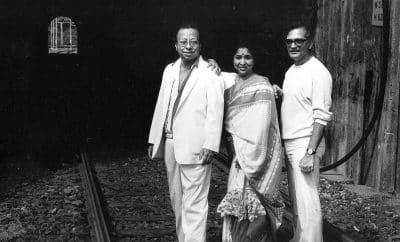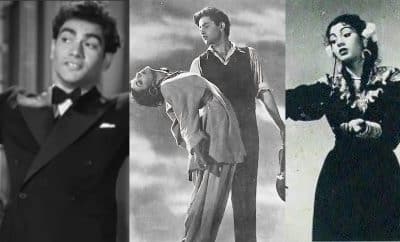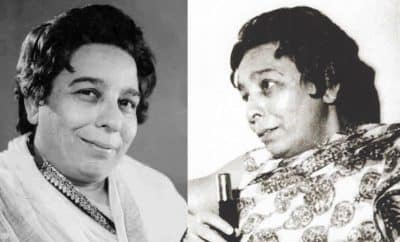Collections
Shankar Jaikishan sans Shailendra and Hasrat Jaipuri
Soon after the mid ‘40s, Hindi cinema was shifting gears and the film music was moulting its skin, with playback singing being on trend. Numerous composers, musicians, singers, and other artistes from several parts of the country started getting attracted to Bombay, like ants to a sugarloaf. It soon became an ensemble of budding artistes trying their hands at and luck with various aspects of cinema. One such young chap from Hyderabad, who played tabla well, was working with Prithviraj Kapoor’s ‘Prithvi Theatres’ as a musician, where he also learned to play a few other instruments like sitar, accordion, and piano. He made friends with another young chap, who hailed from Gujrat and was an adept harmonium player; and brought him also to Prithvi Theatres. Soon they became very close friends, so much so that people started referring to them as ‘Ram – Lakshman’. Apart from working as musicians, ‘the two close friends’ would compose tunes independently in their free time.
It was around this time that Prithviraj Kapoor’s blue-eyed boy Raj Kapoor made his directorial debut with Aag (1948). Ram Ganguly had composed the music for the film and was assisted by ‘the two close friends.’ Raj Kapoor and ‘the two close friends’ already knew each other from Prithvi Theatres. After launching his second directorial venture Barsaat (1949), Raj Kapoor fell out with Ram Ganguly, and decided to try Ram of ‘the two close friends’ as the composer for the film, who insisted that Lakshman would be his partner in the assignment. Thus came into existence the second composer duo of Hindi cinema, after Husnlal – Bhagatram.
It’s anyone’s guess now – ‘the two close friends’ or ‘Ram – Lakshman’ were none other than the celebrated composer duo Shankar – Jaikishan. In Barsaat, they literally rained revolutionary compositions, one better than the other, in their completely fresh and innovative style, which took the entire nation by storm. With this, Hindi cinema saw the rise of not only a new composer duo, but also two new lyricists, Shailendra and Hasrat Jaipuri. Barsaat was the first film to name playback singers in the credits, and Lata Mangeshkar who was still struggling to establish herself got a true recognition, followed by “Aayega aanewala” from Mahal (1949) (where she was not credited as a playback singer though). Mukesh, who had already found his feet as a playback singer also got immense popularity. And all of them – Raj Kapoor, Shankar – Jaikishan, Shailendra, Hasrat Jaipuri, Lata Mangeshkar and Mukesh – went on become a team that would shower on us a great deal of euphonious songs for many years. Shankar – Jaikishan gloriously reigned the landscape of Hindi film music for over 2 decades with their amazing style marked by melody, innovativeness, grand orchestration, and beautiful blend of Indian and western music and musical instruments. Their ability to deliver quickly coupled with these traits brought along a huge commercial success besides name and fame.
When one mentions Shankar – Jaikishan as composers, we reflexively assume that the lyricists would be either Shailendra or Hasrat Jaipuri. Shankar – Jaikishan developed an excellent rapport with Shailendra and Hasrat Jaipuri right from Barsaat and worked in close association with them for Raj Kapoor as well as other banners. Their association only ripened like a sweet fruit over the years, until the untimely demises of Shailendra and Jaikishan.
While the majority of the composer duo’s repertoire has Shailendra and Hasrat Jaipuri as the lyricists and we cannot imagine Shankar – Jaikishan’s music without the two poets, the composer duo has worked with at least 40 other lyricists – this is as astounding as it sounds!
Out of 11 songs from Barsaat, 9 were written by Shailendra and Hasrat Jaipuri and one each was written by Ramesh Shastri and Jalal Malihabadi. Other lyricists appeared only sporadically in their soundtracks thereafter, until Shailendra’s demise in 1966, after which Shankar – Jaikishan’s work with other lyricists shot up. The range of these other lyricists is astonishingly wide – almost all of the then established stalwart lyricists, ancient poets like Mirza Ghalib and Sant Kabir, and some poets who did not venture much into cinema.
Let us take a quick ride through Shankar – Jaikishan’s work with a few of eminent lyricists and poets other than Shailendra and Hasrat Jaipuri.
1. Ramesh Shastri and Jalal Malihabadi
Ramesh Shastri and Jalal Malihabadi wrote one song each for Shankar – Jaikishan’s first soundtrack, Barsaat – the evergreen hit “Hawa mein udta jaaye” and another adorable romantic number “Mujhe kisise pyaar ho gaya” respectively (both sung by Lata Mnageshkar). They did not appear in Shankar – Jaikishan’s music later. While Jalal Malihabadi was seen occasionally in a few movies later, Ramesh Shastri vanished from Hindi cinema in a couple of years after Barsaat.
2. Rajinder Krishan
Rajinder Krishan had amazing mastery over Hindi as well as Urdu. He has written songs of various genres – romantic, devotional, comedy, melancholic – with equal proficiency for various composers. Perhaps due to this adaptability of his, he was the most preferred lyricist by Shankar – Jaikishan after Shailendra and Hasrat Jaipuri. Rajinder Krishan has written around 60 songs for Shankar – Jaikishan, the highest number after their two first preference lyricists. He is one of the few composers who got to write all the songs in a particular soundtrack composed by Shankar – Jaikishan. After College Girl (1960), he started appearing in their music only from the late ‘60s. Brahmachari (1968), Pyar Hi Pyar (1969), Tumse Achha Kaun Hai (1969) and Dharti (1970) are a few notable albums, in which he was the lyricists / one of the lyricists.
The song “Khuda bhi aasman se” from Dharti seems so like a typical Mohammed Rafi – Shankar Jaikishan – Hasrat Jaipuri romantic melody. This shows Rajinder Krishan’s adaptability to different styles.
3. Neeraj
Gopaldas Saxena (popularly known as Neeraj), a poet with a unique style and imagery, started featuring with Shankar – Jaikishan in the late ‘60s. He wrote 25+ songs for the composer duo. Kanyadan (1969), Mera Naam Joker (1971) and Lal Patthar (1972) are a few noteworthy soundtracks that have his lyrics.
In the song “Re man sur mein ga” (sung by Asha Bhosle and Manna Dey) from Lal Patthar, Neeraj fantastically explains the beauty of life using the simile of music.
4. Indeevar
Shyamlal Babu Rai, popular by his pseudonym Indeevar, wrote around 25 songs for Shankar – Jaikishan. However, his presence was mostly limited to a song or two in each of the soundtracks.
The beautiful Mukesh – Suman Kalyanpur duet “Aaya na humko pyaar jataana” from Pehchan (1970) is written by Indeevar.
5. S.H. Bihari
Jhuk Gaya Aasaman (1968), Sapnon Ka Saudagar (1968) and Pagla Kahin Ka (1970) are a few popular albums wherein Shankar – Jaikishan and Shamsul Huda (S.H.) Bihari worked together. He wrote around 12 songs for them for around 10 movies. His presence was also limited to a song or two per soundtrack with Shankar – Jaikishan.
One of the two title songs of Pagla Kahin Ka, “Aye mere dil yahaan tu akela nahin” was written by S.H. Bihari. Hasrat Jaipuri wrote the other title song, “Log kahen mujhe pagla kahin ka”.
6. Majrooh Sultanpuri
The prolific poet conveying the seemingly ordinary messages in unique and astonishing ways, Majrooh Sultanpuri, has featured as lyricist only in 7 songs from 2 soundtracks composed by Shankar – Jaikishan, viz. Neelima (1975) and Mehfil (1981).
7. Gulzar
The word-wizard Gulzar has worked with Shankar – Jaikishan only for three songs in one soundtrack, Seema (1971).
8. Anand Bakshi
Shankar – Jaikishan worked with the ‘Aam Aadmi Lyricist’ Anand Bakshi only in one film, Main Sunder Hoon (1971). Anand Bakshi wrote all the 6 songs in the soundtrack.
9. Shaily Shailendra
Kaviraj Shailendra’s son, Shaily Shailendra, became a lyricist at the age of 17, kind of by accident, when Raj Kapoor asked him to complete the song “Jeena yahaan, marna yahaan”, (Mera Naam Joker – 1971) which Shailendra had started writing but was left incomplete due to his demise. He then wrote songs for a handful of films, but seems to have chosen not to pursue lyrics writing as the career thereafter. The playful song “Hum jab honge saath saal ke” written by him for Kal Aaj Aur Kal (1971) remains popular to date.
https://www.youtube.com/watch?v=xh_h2vBTckQ
10. Sant Kabir and Mirza Ghalib
Shankar – Jaikishan used a couple of Sant Kabir’s ‘Dohe’ in Mukesh’s voice for Jis Desh Mein Ganga Behti Hai (1961).
They also used a few couplets from Mirza Ghalib’s ghazal, “Ye na thi hamari kismat”, as a mujra in Usha Mangeshkar’s voice in Main Nashe Mein Hoon (1959). This song is coupled with Mukesh’s “Mujhko yaaron maaf karna, main nashi mein hoon” in the film.
11. Usha Uthup
Usha Iyer (Uthup) is credited for the lyrics of two English songs that she has sung under Shankar – Jaikishan’s baton for Merchant Ivory Productions’ Bombay Talkie (1970).
Quite a few other eminent lyricists of golden era, like Bharat Vyas, Narendra Sharma, Prem Dhawan, Shakeel Badayuni, Kaifi Azmi and Shaharyar also featured in the soundtracks composed by Shankar – Jaikishan. There is a big list of the other well-known lyricists who worked with Shankar Jaikishan, e.g., Verma Malik, Gushan Bawra, Anjaan, Naqsh Lyallpuri, Aziz Kashmiri, Farooq Qaisar, M.G. Hashmat, Anjum Jaipuri and Dev Kohli, to name a few. Verma Malik tops the list with 30+ songs.
A few other names, who ventured into the film music for a short while and wrote a few songs for Shankar – Jaikishan amongst others, are Vishweshvar Sharma, Vitthalbhai Patel and Inderjeet Singh Tulsi. This is not, however, the end of the list. There are many other names which were lost in oblivion after writing for a movie or two.
Hope you enjoyed a glimpse of the humongous work that Shankar – Jaikishan have done sans Shailendra and Hasrat Jaipuri.




Amol
October 15, 2022 at 10:30 am
Wow.. Wow.. No words to describe.. Hats off to you Dear K Yogesh.. I never knew the songs besides Shailendra Hasrat Jaipuri and Rajendra Krishna for Shankar Jaikishan.. Great information and what a script.. Toll us to SJ era.. ?
YOGESH
October 17, 2022 at 1:52 pm
Many thanks, Amol!
Madhupati Sharma
October 15, 2022 at 3:00 pm
The offbeat topics in uniquely crafted fashion with the best gems weave in the thread always make your write-ups apart from commonality. Particularly, this one for the emperors.
I add from my side a favourite from Dev Kohli..
https://youtu.be/Ays7xJK8UF8
YOGESH
October 17, 2022 at 1:53 pm
Thanks a lot, Madhupati ji! Yes, “Geet gaata hoon main” is another classic from Lal Patthar…